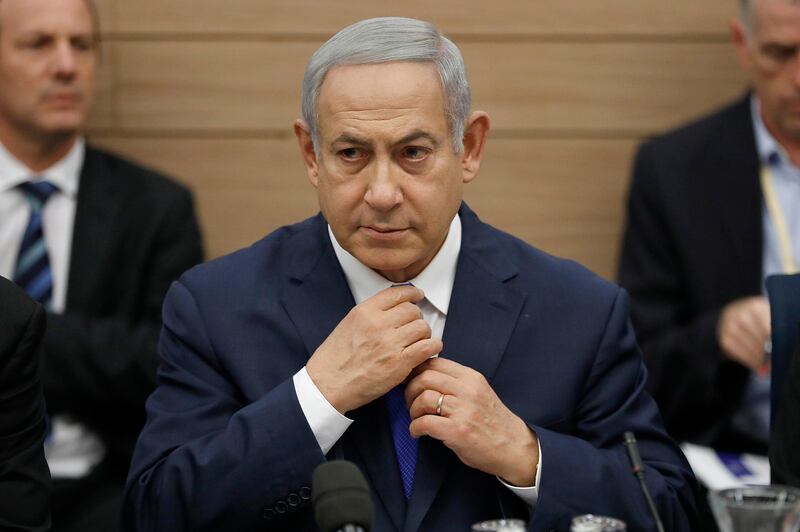On Sunday evening, Israel’s embattled Prime Minister Benjamin Netanyahu said there was no room for politics amid “a military campaign” in Gaza, as he tried to maintain his disintegrating ruling coalition. But on Monday, his coalition government appeared to be on the brink of implosion.
His right-wing coalition partners had pushed hard for a new operation in Gaza to stop border protests and incendiary devices crossing into Israeli territory, with the defence minister resigning and painting Mr Netanyahu as weak on security. The view in Israel on Monday morning was that Mr Netanyahu's speech on Sunday night, delivered at the same time as the main network broadcasts, was the start of an inevitable election campaign.
But, in a remarkable turn of events, he managed to scare his right-wing rivals enough to prevent them from resigning over last week’s Gaza truce with Hamas, a move that would have brought down his government and heralded early elections that could have removed him from power.
In a press conference on Monday morning, Education Minister Naftali Bennett and Justice Minister Ayelet Shaked of the Jewish Home party were expected announce their resignations, following in the footsteps of Avigdor Lieberman of Yisrael Beitenu whose resignation last week triggered the crisis.
Instead, they launched into a withering criticism of the prime minister over his handling of Gaza clashes but stopped short of their threats to resign and leave him without a parliamentary majority, saying they would give Mr Netanyahu another chance to change direction.
An impassioned television address on Sunday and another speech in the Israeli parliament delivered moments before the pair spoke did enough for Mr Netanyahu, Israel’s second-longest serving leader, to survive another day. He had cornered Mr Bennett and Ms Shaked by accusing them of being “irresponsible” in preparing to bring down a right-wing government at a time of security challenges, a position that would have been ill-received by their nationalist base.
Their decision came a week after far-right Defence Minister Avigdor Lieberman resigned over the Gaza ceasefire that has brought relative quiet to the shared border following a botched Israeli special forces operation inside the enclave. His exit left Mr Netanyahu clinging to a single seat parliamentary majority. Aiming to limit the influence of Mr Bennett, he refused to give him the defence minister post despite the far-right faction’s demands and took the position for himself.
The far-right, pro-settler minister had demanded the defence brief but Mr Netanyahu will now serve in that capacity for at least several months. Mr Bennett accepted that but called on Mr Netanyahu to be more right-wing in his leadership.
Mr Bennett’s Jewish Home party said that the prime minister was supposed to be a right-wing leader but “acts left”. It said that the Israeli public was “tired of voting right but getting left”. That was set to be the dominant discourse in any election campaign.
According to Einat Wilf, a former member of the Knesset and fellow at the Washington Institute for Near East Policy, Mr Bennett fears that with the large overlap between their parties’ bases, voters would have prioritised Mr Netanyahu’s survival over strengthening Jewish Home.
Mr Bennett’s about-face now means that Mr Netanyahu appears to have averted early elections. Mr Lieberman tried to bring about the downfall of the prime minister’s government but now he looks most likely to not make it out of the other side of this crisis.
_______________
Read more:
Netanyahu says calling Israeli snap polls now would be ‘irresponsible’
Israel's Netanyahu to hold 'decisive' meeting on coalition
Electoral pressure may push Israel into new Gaza attack, analysts say
Israel's Netanyahu struggles to stave off election pressure
_______________
Some in the Israeli parliament believe early polls are still possible given the coalition’s slim majority.
“The coalition hasn’t been functioning properly for several weeks. We will go to elections even if Bennett and Ayelet Shaked don’t resign,” Roy Folkman, chair of the centrist Kulanu faction, had told Israel’s Army Radio.
Commentators in Israel accused Mr Netanyahu of hypocrisy in trumpeting security over politics while refusing to appoint a new defence chief to oversee the Gaza portfolio. He already serves as Israel’s foreign minister. But he is now expected to appoint a new foreign minister and reshuffle other positions in his cabinet in a bid to shore up his authority.
While Mr Netanyahu’s influence over voters and ministers remains strong on security, other issues could yet cause his downfall.
He remains dogged by corruption allegations. Israel’s attorney general is deliberating over whether to indict him for bribery and breach of trust. If indicted, Mr Netanyahu would be expected to resign, the attorney general has said.
But the man who has served as Israel’s premier for more than a decade remains wildly popular, denies wrongdoing and says he has no intention of leaving. If he survives until the end of next year – whether by winning early elections or those due by next November – he would fulfill his dream of becoming Israel’s longest-serving leader.
Mr Netanyahu's strategy has long been risk averse, according to Ms Wilf.
"He's conservative in the sense that if you really don't need to change anything don't," she says. "He's not eager to make moves, either for peace or for war."





